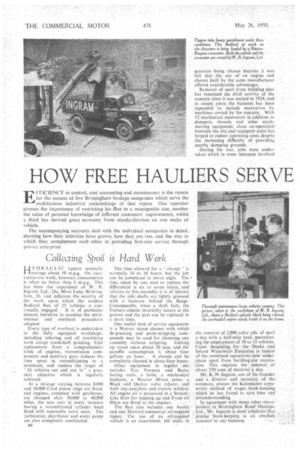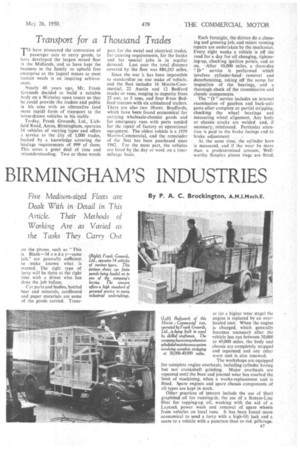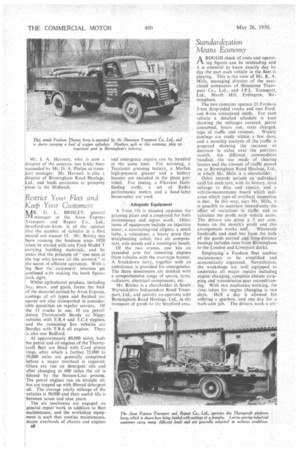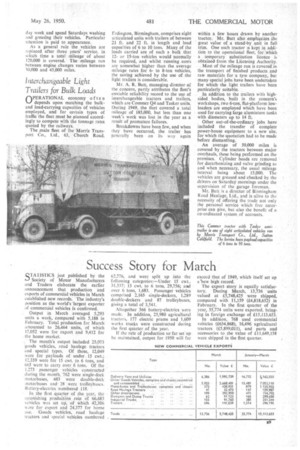HOW FREE HAULIERS SERVE BIRMINGHAM'S INDUSTRIES
Page 40

Page 41

Page 42

Page 43

If you've noticed an error in this article please click here to report it so we can fix it.
By P. A. C. Brockington, A.M.I.Mech.E. F. 4FFIC1ENCY in control, cost accounting and maintenance is the reason for the success of five Birmingham haulage companies which serve the multifarious industrial undertakings of that region One operator stresses the importance of restricting his freet to a manageable size, another the value of personal knowledge of different customers requirements, whilst a third has derived great economy from standardization on one make of
vehicle. .
The accompanying accounts deal with the individual companies in detail, showing how their activities have grown, how they are run, and the way in which they complement each other in providing first-rate service through private enterprise.
Collecting Spoil is Hard Work _
YDR.A U L IC tippers normally
'average about 10 m.p.g. On excavation-site work, however, consumption is often rio better than. 3 m.P.e. This has been the experience of W. R. Ingram, 14d., 24a, Moat Lane, RirrnMea ham, 26. and indicates the severity of the work upon which the modern Bedford fleet of 25 vehicles is con tinually engaged. It iS of particular interest therefore to examine the maintenance and overhaul Procedure.s adopted.
Every type of overhaul is undertaken in the fully equipped workshops, including reboring and all machining work except crankshaft grinding. Unit replacement from a comprehensive stock of engines, transmission components and auxiliary gear; reduces the lime spent in reconditioning to a minimum, and renders the target of " 24 vehicles out and one in a practical objective which is regularly achieved.
At a mileage varying 'between 8,000 and 18,000 Cord piston rings are fitted, and engines, complete with gearboxes, are changed after 30,000 to 40,000 miles, the new unit in every instance having a reconditioned cylinder head fitted with renewable valve seats. The carburetter; distributor and water pump are also completely overhauled.
136
The time allowed for a charm:" is normally 16 to '18 hours, but the job can be completed in about eight. The* time taken by one man to replace the differential is six to seven hours, and relative to this assembly it is of interest that the Side shafts are lightly grooved with a hacksaw behind the flange. Consequently, when a shaft fails, the fracture almost invariably occurs at the groove and the part can be replaced in ashort time One-uscful Item of service equipment is a .Weaver steam cleaner, with which de-greasing and paint-stripping 'compounds may be used for cleansing any
assembly without stripping. Getting up steam takes,about 30 secs. and the paraffin consumption is about four gallons an hour. A chassis can be completely cleaned in about four hours.
Other equipment in regular use includes Van Norman and 13urna boring tools. a lathe, a mechanical hacksaw, a Weaver 60-ton press, a Black and Decker valve refacer, and both oxy-acetylene and electricwelders. All engine oil is processed in a, StrearnLine filter for topping ittp and Frain oil filters are fitted to the engines.
The fleet also includes one Austin and one Morris-Connmercial oil-engined tipper. The use of an ell=enginedvehicle is an experiment the 'make in
question being chosen because it was felt that the use of an engine and chassis built by the same manufacturer offered considerable advantages.
Removal of spoil from building sites has remained the chief activity of the concern since it was started in 1924, and in recent _years the business has been expanded to include excavation by machines owned by the concern. With 12 mechanical excavators in addition to dumpers, shovels and other earth
moving equipment, close co-operation betWeen the site and transport units has helped to reduce operating costs despite the increasing difficulty of providing nearby dumping grounds.
During the war, jobs were undertaken which in some instances involved the removal of 2.000 cubic yds. of spoil a day with a half-mile haul, necessitating the employment of 10 to 12 vehicles. Canal deepening for the Docks and Inland Waterways Executive is typical of the combined operations now under, taken apart from building-site excavatiOn. This requires the removal of about 250 tons of material a day.
Mr. R. N. Ingram, son of the founder and a director and secretary of the company, praises the Kalamazoo cnpywriter method of wages book-keeping which he has found to save time and misunderstanding.
In agreement with many other shareholders in 13iriningharn Road Haulage, Ltd., Mr. Ingram is most erriphatic that precise book keeping is an absOlute essential to any business.
on the phone, such as "This is Blank—M anda y—same job," are generally sufficient to make known what is wanted. The right type of lorry will be there at the right time with a driver who has done the job before.
Car parts and bodies, bottled beer and minerals, cardboard and paper materials are some of the goods carried. Trans or (at a higher wear stage) the engine is replaeed by an overhauled unit. When the engine is changed, which generally becomes necessark after the vehicle has run between 30,000 to 40,000 miles, the body and chassis are completely stripped and repainted and any other worn unit is also renewed.
The workshops are equipped for complete engine overhauls, including cylinder boring but not crankshaft grinding. Major overhauls are repeated until the bore and journal wear has reached the limit of machining, when a works-replacement unit is fitted. Spare engines and spare chassis components of all types are kept in stock.
Other practices of interest include the use of Shell graphited oil for running-in, the use of a Stream-Line filter for topping-up oil, washing with the aid of a Laycock power wash and removal of spare wheels from vehicles on local runs. It has been found more economical to send a lorry with a high-lift jack and a spare to a vehicle with a puncture than to risk pilferage. Mr. J. A. Hartnett, who is now a director of the concern, has lately been succeeded by Mr. D. A. Phelps as transport manager. Mr. Hartnett is also a director of Birmingham Road Haulage, Ltd., and lends assistance to grouping plans in the Midlands.
Restrict. Your Fleet and Keep Your Customers
ik 4R. G. L. BR1SLEY, general iVI manager of the Avon Express Transport and Repair Co., Ltd., Stratford-on-Avon, is of the opinion that the number of vehicles in a fleet should not exceed 15. Mr. Brisley has been running the business since 1920 when he started with one Ford Model T carrying building materials, and he states that the principle of "one man at the top who knows all the answers" is the secret of efficient operation. With a big fleet the customers' interests get confused with making the book figures look right.
Whilst agricultural produce, including hay, straw, and grain, forms the bulk of the material carried by Avon Express, castings of all types and finished car spares are also transported in considerable quantities on regular services. Of the 15 trucks in use, 10 are petroldniven Tharnyeroft Sturdy or Nippy vehicles with E.R.4 and T.C.4 engines, and the remaining five vehicles are Sturdys with T.R.6 oil engines. There is also one Bedford.
At approximately 80,000 miles, both the petrol and oil engines of the Thornycroft fleet are fitted with Cord piston rings, after which a further 25,000 to 50,000 miles are generally completed before, a major overhaul is required. Oilers are run on detergent oils and after changing at 600 miles the oil is filtered by the Stream-Line process. The petrol engines run on straight oil, but are topped up with filtered detergent oil. The average yearly mileage of the vehicles is 30,000 and their useful life is between seven and nine years.
The six mechanics are engaged on general repair 'work in addition to fleet maintenance, and the workshop equipment is such that routine maintenance, major overhauls of chassis and engines B8
and emergency, repairs can be handled at the same time. For servicing, a Tecalemit greasing battery, a Marfak high-pressure greaser and a battery booster are included in the plant provided. For testing, a Pikavant faultfinding outfit, a set of Redex performance meters and a head-lamp beam-setter are used.
• . Adequate Equipment A 5-ton lift is situated opposite the greasing plant and is employed for both maintenance and repair work. Other items of equipment include an injection tester, a connecting-rod aligner, a small lathe, a vulcanizer, a heavy press (for straightening axles), two air compressors, axle stands and a runningin bench.
Of the two cranes, one has an extended arm for removing engines from vehicles with the over-type bonnet. A breakdown lorry, together with an ambulance, is provided for. emergencies. The three storerooms are stocked with a comprehensive range: of spares, tyres, radiators, electrical components, etc.
Mr. Brisley is a shareholder in South Warwickshire Independent Road Transport, Ltd., and actively co-operates with Birmingham Road Haulage, Ltd., in the transport of goods to the Stratford area. The
Standardizatton Means Economy
AROUGH check of costs and operating figures can be misleading and it. is essential to know exactly day by day the part each vehicle in the fleet is playing. This is the view of Mr. R. A. Mills, managing director of the associated companies of Shenstone Transport Co., Ltd., and J.P.L. Transport, Ltd., Marsh Hill, Erdington, Birmingham.
The two concerns operate 25 Fordson 5-ton drop-sided trucks and one Fordson 8-ton articulated outfit. For each vehicle a detailed schedule is kept showing the mileages covered, petrol Consumed, hours run, rates charged,
type of traffic and revenue. Weekly costings are ready within a few days, and a monthly analysis of the traffic is prepared showing the increase or decrease in value over the previous month, the different ;' commodities handled, the use made -of clearing houses and the amount of traffic passed on to Birmingham Road Haulage, Ltd., in which Mr. Mills is a shareholder.
Other records include art individual card for each tyre., with its history, total mileage to date and repairs, and it vehicle-maintenance board which indicates which type of, overhaul inspection is due. In this way; says Mr. Mills, it is possible to ascertain immediately the.. effect of variations in traffic and to calculate the profit each vehicle earns. The drivers are given a 5 per cent. bonus on the month's profit and this
arrangement works well. Wholesale foodstuffs and steel bar form the bulk of the goods carried and long-distance " haulage includes runs from Birmingham to the London and Liverpool docks.
Employing a Fordson fleet enables maintenance to be simplified and economically organized. Nevertheless, the workshops are, well equipped to undertake all major repairs including engine changing, complete chassis stripping and transmission-gear reconditioning. With two mechanics working, the time taken for engine changing is two days. Halt a day is allowed for refitting a gearbox, and one day for a back-axle job. The drivers work asix
day week and spend Saturdays washing end greasing their vehicles. Particular attention is paid to appearance.
As a general rule the vehicles are replaced after three years' service, in which time a total mileage of about 120,000 is covered. The mileage run between engine changes varies between 10,000 and 45,000 miles.
Interchangeable Light Trailers for Bulk Loads nPERATIONAL economy often
depends upon matching the bulkand load-carrying capacities of vehicles employed, and for certain types of traffic the fleet must be planned accordingly to compete with the tonnage rates quoted by the railways.
The main fleet of the Morris Transport Co., Ltd., 63, Church Road,
rrdington, Birmingham, comprises eight articulated units with trailers of between 21 ft. and 22 ft. in length and load capacities of 6 to 10 tons. Many of the loads carried are of such a bulk that 12or 15-ton vehicles would normally be required, and whilst running costs are somewhat higher than the average mileage rates for 6to 8-ton vehicles, the saving achieved by the use of the light trailers is considerable.
Mr. A. R. Butt, managing director of the concern, partly attributes the fleet's enviable reliability record to the use of interchangeable tractors and trailers, which are Commer Q4.and Tasker units. During 1949, the fleet covered a total mileage of 185,000, but less than one week's work was lost in the year as a result of premature failures.
Breakdowns have been few, and when they have occurred, the trailer has generally been on its way again within a few hours drawn by another tractOr. Mr. Butt also empha,sizesdhe great value of a stand-by unit in full trim. One such tractor is kept in addition to the operational fleet, foCwhich a temporary substitution licence is obtained from the Licensing Authority.
Most of the mileage run is covered in the transport of finished products and raw materials for a tyre company, but many special jobs have been undertaken for which the light trailers have been particularly suitable. In addition to the trailers with highsided bodies, built in the concern's workshops, two 6-ton, flat-platform lowloaders are employed which have been used for carrying large aluminium tanks with diameters up to 14 ft.
Other out-of-the-ordinary jobs have included the transfer of complete power-house equipment to a new site, for which the quotation had to be made before dismantling.
An average of 50,000 miles is covered by the tractors between major overhauls, these being performed on the premises. Cylinder heads are removed for decarbonizing and valve grinding as and when necessary, the usual mileage interval being about 15,000. The vehicles are greased and checked by the drivers on Saturday mornings under the supervision of the garage foreman.
Mr. Butt is a director of Birmingham Road Haulage, Ltd., and is alive to the
of offering the trade not only the personal service which free enterprise can give, but also the benefit of aco-ordinated system of accounts.




























































































